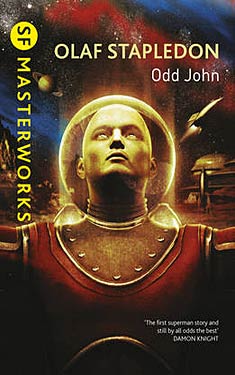Olaf Stapledon
Completed 5/20/2018, Reviewed 5/20/2018
4 stars
This book was first published in 1935. It has aged remarkably well. It reminded me somewhat of Theodore Sturgeon’s
“More Than Human” which was written nearly twenty years later. It’s about the next stage of human
development, homo superior. The “superman” concept has some similarities
to the works of Nietzsche. Though I’ve
never read Nietzsche, I am a little familiar with his ideas. It tackles the concept of the morality of the
superman with respect to the normal homo
sapiens. I liked the book, finding
it generally readable, although much of it is, like a lot of early science
fiction, about ideas rather than a real plot.
The basic premise is that a superhuman is born to an average
family in England. Named John and
nicknamed Odd John by his mother, he matures mentally faster than he does
physically. He’s disruptive at school of
course so he learns at home. He tackles
subjects in fits and starts, growing tired of them after he’s read almost
everything there is to read about them, then extrapolating the concepts in his
own mind. Eventually, he decides he must
find others of his kind around the world and create a colony of
superhumans. The book mostly focuses on
his growing up, rejecting human morality and creating his own.
The character of Odd John is not very likeable. He’s the ultimate precocious child. He flaunts his superiority over his siblings
and friends. He learns to have complete
control over his body and has little emotion.
He’s uber-rational and condescending.
He murders someone at the age of ten.
The narrator is a friend of the family and journalist who basically
becomes a slave to John’s whims. But he
reacts with horror at John’s lack of human morality, so we at least can identify
with the narrator. Despite John’s deplorable
behavior, I was still kind of rooting for him, even though in the first chapter
you find out his story ends tragically.
The book is short, an easy two day read. The prose is very smooth, very readable, especially
for an older novel. The only part I had
got kind of lost in was a middle chapter where John and the narrator get into a
philosophical discussion of Christianity and Communism. I was a little tired when I read that part
and didn’t follow the arguments too well.
Doing a little research on the author, I discovered he was a Philosophy
professor in England, and well, I never took philosophy in college.
I particularly liked a couple of chapters where John is
finding other superhumans. The narrator
gives brief biographies of some of these people as well. It’s interesting to see how these people grew
up with their “gifts” and compare and contrast them to John’s youth.
I give the book four stars out of five. I was engrossed with what happens next. Even though we know that it’s going to end
tragically, the journey is quite good.

No comments:
Post a Comment